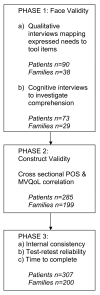Validation of a core outcome measure for palliative care in Africa: the APCA African Palliative Outcome Scale
- PMID: 20100332
- PMCID: PMC2825183
- DOI: 10.1186/1477-7525-8-10
Validation of a core outcome measure for palliative care in Africa: the APCA African Palliative Outcome Scale
Abstract
Background: Despite the burden of progressive incurable disease in Africa, there is almost no evidence on patient care or outcomes. A primary reason has been the lack of appropriate locally-validated outcome tools. This study aimed to validate a multidimensional scale (the APCA African Palliative Outcome Scale) in a multi-centred international study.
Methods: Validation was conducted across 5 African services and in 3 phases: Phase 1. Face validity: content analysis of qualitative interviews and cognitive interviewing of POS; Phase 2. Construct validity: correlation of POS with Missoula-Vitas Quality of Life Index (Spearman's rank tests); Phase 3. Internal consistency (Cronbach's alpha calculated twice using 2 datasets), test-retest reliability (intraclass correlation coefficients calculated for 2 time points) and time to complete (calculated twice using 2 datasets).
Results: The validation involved 682 patients and 437 family carers, interviewed in 8 different languages. Phase 1. Qualitative interviews (N = 90 patients; N = 38 carers) showed POS items mapped well onto identified needs; cognitive interviews (N = 73 patients; N = 29 carers) demonstrated good interpretation; Phase 2. POS-MVQoLI Spearman's rank correlations were low-moderate as expected (N = 285); Phase 3. (N = 307, 2nd assessment mean 21.2 hours after first, SD 7.2) Cronbach's Alpha was 0.6 on both datasets, indicating expected moderate internal consistency; test-retest found high intra-class correlation coefficients for all items (0.78-0.89); median time to complete 7 mins, reducing to 5 mins at second visit.
Conclusions: The APCA African POS has sound psychometric properties, is well comprehended and brief to use. Application of this tool offers the opportunity to at last address the omissions of palliative care research in Africa.
Similar articles
-
A novel child-centred core palliative care outcome measure for use in clinical practice and research: findings from a multinational validation study.Health Qual Life Outcomes. 2025 Apr 21;23(1):41. doi: 10.1186/s12955-025-02346-2. Health Qual Life Outcomes. 2025. PMID: 40259305 Free PMC article.
-
Outcome measurement in paediatric palliative care: lessons from the past and future developments.Ann Palliat Med. 2018 Oct;7(Suppl 3):S151-S163. doi: 10.21037/apm.2018.04.02. Epub 2018 Jun 19. Ann Palliat Med. 2018. PMID: 30180720 Review.
-
Validity and reliability of the integrated palliative care outcome scale (IPOS) in Korea: a multicenter study of terminally ill cancer patients.BMC Palliat Care. 2024 Dec 23;23(1):298. doi: 10.1186/s12904-024-01630-0. BMC Palliat Care. 2024. PMID: 39716151 Free PMC article.
-
Psychometric properties of the Czech Integrated Palliative Outcome Scale: reliability and content validity analysis.BMC Palliat Care. 2020 Mar 25;19(1):39. doi: 10.1186/s12904-020-00552-x. BMC Palliat Care. 2020. PMID: 32213172 Free PMC article.
-
'Peace' and 'life worthwhile' as measures of spiritual well-being in African palliative care: a mixed-methods study.Health Qual Life Outcomes. 2013 Jun 10;11:94. doi: 10.1186/1477-7525-11-94. Health Qual Life Outcomes. 2013. PMID: 23758738 Free PMC article.
Cited by
-
'My dreams are shuttered down and it hurts lots'-a qualitative study of palliative care needs and their management by HIV outpatient services in Kenya and Uganda.BMC Palliat Care. 2013 Oct 7;12(1):35. doi: 10.1186/1472-684X-12-35. BMC Palliat Care. 2013. PMID: 24098941 Free PMC article.
-
A Prospective Cohort Study of Factors Associated With Place of Death Among Patients With Late-Stage Cancer in Southern Africa.J Pain Symptom Manage. 2019 May;57(5):923-932. doi: 10.1016/j.jpainsymman.2019.01.014. Epub 2019 Jan 30. J Pain Symptom Manage. 2019. PMID: 30708125 Free PMC article.
-
HeAlth System StrEngThening in four sub-Saharan African countries (ASSET) to achieve high-quality, evidence-informed surgical, maternal and newborn, and primary care: protocol for pre-implementation phase studies.Glob Health Action. 2022 Dec 31;15(1):1987044. doi: 10.1080/16549716.2021.1987044. Glob Health Action. 2022. PMID: 35037844 Free PMC article. Review.
-
Collaboration across continents to produce e-learning for palliative care education in Sub Saharan Africa.Ecancermedicalscience. 2014 May 27;8:ed36. doi: 10.3332/ecancer.2014.ed36. eCollection 2014. Ecancermedicalscience. 2014. PMID: 24932214 Free PMC article. No abstract available.
-
Concordance in the Assessment of Effectiveness of Palliative Care between Patients and Palliative Care Nurses in Malaysia: A Study with the Palliative Care Outcome Scale.Indian J Palliat Care. 2017 Jan-Mar;23(1):46-52. doi: 10.4103/0973-1075.197961. Indian J Palliat Care. 2017. PMID: 28216862 Free PMC article.
References
-
- UNAIDS. AIDS Epidemic Update 2007. Geneva: World Health Organisation; 2007.
-
- UNAIDS, WHO 2006. Report on the global AIDS epidemic. 2006.
-
- American Cancer Society. Global cancer: facts and figures. US. 2007.
Publication types
MeSH terms
LinkOut - more resources
Full Text Sources
Medical


